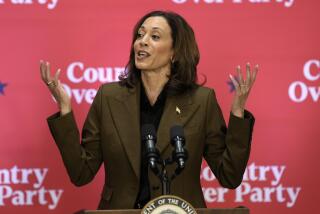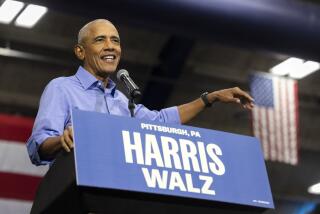Obama faces hurdles bigger than his race
WASHINGTON — For the first time, a major political party is on the brink of choosing an African American as its candidate for president, but when Democratic strategists and other analysts look ahead, they don’t see race as Barack Obama’s biggest challenge.
They worry more, they say, about other issues: Will swing voters view him as too young? Too inexperienced? Or too liberal?
“I am sure there are people in Missouri that won’t vote for Barack Obama because he’s black, but there are not that many of them,” said Sen. Claire McCaskill (D-Mo.), a swing-state leader who endorsed Obama early. “I don’t think that’s going be a deal breaker.”
Instead, she said, Obama’s most important test should he lock up the nomination will come from Republican efforts to paint him as an elitist, a social and cultural liberal outside the mainstream of American life. “The key is going to be whether Barack can avoid getting on defense on social ‘wedge’ issues and can stay on the offense on economic issues,” McCaskill said.
Polls suggest McCaskill may be right.
A survey released this month by the independent Pew Research Center found that most voters described Arizona Sen. John McCain, the presumptive Republican nominee, as “a centrist whose views are fairly close to their own,” even though McCain describes himself as a thoroughgoing conservative. The same voters described Obama as the most liberal of the candidates still in the race, well to the left of what they saw as the midpoint of American politics.
And Obama ranked below both McCain and New York Sen. Hillary Rodham Clinton, his rival for the Democratic nomination, on the question of whether the candidate was “tough enough” to protect the nation’s security.
Obama has “handicaps and potential problems, race being one of them, [but] it’s not the only one,” Pew Center President Andrew Kohut said. “He is perceived as a liberal. He is perceived by many voters as not well grounded on foreign policy and not tough enough . . . and he has a potential problem, distinct from race, of being seen as an elitist, an intellectual.”
Taken together, that’s a formidable catalog of vulnerabilities. In an ordinary election year, and with a more traditional candidate, it might make a Democratic victory hard to envision. But 2008 is not an ordinary political year: Republicans are weighted down by an unpopular incumbent, a presumed nominee who supports an unpopular war, and economic troubles that threaten voters in their homes, their jobs and their pocketbooks.
Moreover, Obama is not an ordinary candidate. An African American with an unusual life story, a liberal record and relatively little national experience, he has put together a campaign machine that has out-organized, outmaneuvered and outlasted some of the toughest, most experienced politicians in his party. And Obama has shown an exceptional ability to win over independents and draw thousands of new voters to his banner.
As a result, leaders in both parties acknowledge that much remains unknown and untested about the coming campaign. Privately, some Republican strategists say that, in contrast with the relatively familiar partisan challenge posed by Clinton, the level of uncertainty is so high with Obama that they can envision him winning in a landslide -- or losing by a similar margin.
And Mitch Ceasar, chairman of the Broward County Democratic Party, said party strategists aren’t sure how Obama’s unusual background will play there. “This is a political generational change, both in terms of the candidate definition and the groups to which he appeals,” Ceasar said.
Obama acknowledges potential vulnerabilities, but he and his strategists believe those would be overshadowed in the general election campaign by economic and other issues.
“Every candidate has strengths and weaknesses,” Obama said Saturday at a news conference in Bend, Ore. “I no doubt have weaknesses, but I think I have enormous strengths as well. And in a contest between myself and John McCain . . . I think this is going to be a very concrete contest around very specific plans for how we improve the lives of Americans.”
To a significant degree, the focal point of Obama’s challenge appears to be white working-class voters.
In a Los Angeles Times/Bloomberg poll released Friday, voters as a whole said they preferred Obama over McCain by 46% to 40%, with 9% undecided. Among white voters, however, McCain outpolled Obama by 45% to 41%. Obama’s strong support among black voters helped account for his overall plurality.
Obama’s deficit among white voters is not unusual for Democratic candidates. In 2004 and 2000, Democrats John F. Kerry and Al Gore both lost the white vote to George W. Bush by wide margins, but the overall results were much closer. Indeed, Gore narrowly won the popular vote, and lost the White House only after litigation over the electoral vote.
“The white working class has gone to the Republican nominee for many elections, going back even to the Clinton years,” Obama strategist David Axelrod told National Public Radio on April 23, after his candidate lost the Pennsylvania primary to Hillary Clinton. “This is not new that Democratic candidates don’t rely solely on those votes.”
Still, Obama strategists acknowledge that one of their first tasks is reaching out to the Democrats who tended to vote for Clinton in Pennsylvania and other battleground states such as Ohio, Missouri and Florida: not only blue-collar, downscale white voters, but also older voters, Latinos and Jews.
This month, Obama plans to spend three days in Miami and the Tampa Bay area.
Ceasar, the Broward County Democratic leader, predicted that at least one group, Jewish voters, will remain in the Democratic fold despite their preference for Clinton as a nominee. “They will sit shiva for a couple of weeks,” Ceasar said, referring to the Jewish tradition of mourning, “and then their Democratic DNA will kick in and they’ll be enthusiastic supporters of the nominee.”
McCaskill said she hopes Obama will make time to visit relatively conservative, largely white rural areas in her state. “People are hurting because of the economy; gas prices hit people in rural areas more heavily because they have longer distances to go,” she said. “Barack has a good message on the economy . . . and that’s a tough barrel for John McCain to get around.”
On the flip side of the demographic issue, Obama’s ability to increase the turnout of African American voters could boost Democrats in several key states won by Bush in 2004, including Virginia, Florida, Ohio and Missouri.
David Bositis, an expert on black politics and voting trends at the Joint Center for Political and Economic Studies in Washington, predicts that black voter turnout could be 20% higher this year than it was four years ago.
In Ohio, where Bush won 16% of the black vote, Obama could not only attract many of those Bush voters but bring out more black voters overall -- enough, potentially, to erase the GOP’s past margins of victory. In Florida, Bositis pointed to the 2000 election, when record black turnout was credited with helping Gore come within a whisker of winning the state.
The notion that his race may not be Obama’s greatest potential vulnerability is reflected in the fact that Republican strategists are already working to paint him as a liberal. In recent weeks, conservative groups have aired ads suggesting the Illinois senator is out of step with middle-American values.
One GOP television commercial in Mississippi featured Obama’s controversial former pastor, the Rev. Jeremiah A. Wright Jr., and accused a local Democratic House candidate of preferring Obama and Wright “over our conservative values.”
Privately, some Republicans say they also hope to raise doubts about Obama’s patriotism. McCain’s TV ads stress his five years as a prisoner of war in Vietnam. One GOP operative, speaking on condition of anonymity, said strategists have proposed an ad picturing a series of Democratic politicians, all but one -- Obama -- wearing a U.S. flag pin.
“Here’s the tagline: What’s he got against the American flag?” the operative said.
Not surprisingly, Obama supporters, who include Kerry, bristle at such talk.
“Let ‘em try,” the Massachusetts senator said. “I believe they are going to have great difficulty because of Barack Obama’s life, and his demeanor, his manner, who he is and what he’s done.”
Republicans are unlikely to raise the issue of Obama’s race, in part because McCain has promised to run what he calls “a respectful campaign.” Also, GOP strategists are wary of the potential backlash, particularly among moderate suburban women.
Even if race is not explicitly an issue, historian Robert Dallek said, the black-white divide will inevitably be a factor.
“This is clearly an important moment in the country’s history,” said Dallek, author of biographies of Presidents Kennedy and Lyndon B. Johnson. “Just 45 years ago, who could have possibly imagined that an African American could have been the nominee of the Democratic Party, which as recently as 1963 was the stronghold of Southern segregation?
“It means this campaign is going to be, in part, a running national conversation about race. You can’t escape it.
“But it will also be about Bush,” Dallek added. “The Democrats will not for a moment let voters forget that McCain is in the Republican Party, that he will be the third term of an unpopular administration.”
--
--
peter.wallsten@latimes.com
--
Times staff writer Robin Abcarian contributed to this article from Bend, Ore.
More to Read
Get the L.A. Times Politics newsletter
Deeply reported insights into legislation, politics and policy from Sacramento, Washington and beyond. In your inbox three times per week.
You may occasionally receive promotional content from the Los Angeles Times.











